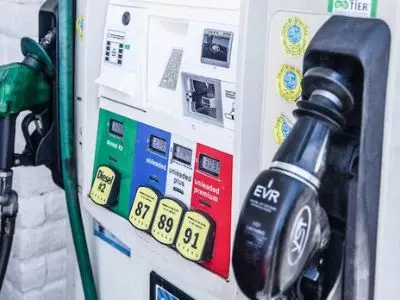Most modern transportation technologies rely heavily on fossil fuels, releasing carbon dioxide into the atmosphere, thus contributing on a huge scale to climate change.
But, there are alternatives.
Alternatives to fossil fuels for transportation include electricity and hydrogen for consumer vehicles, biofuels for aviation and air shipping, and wind power for ocean shipping.
Understanding fossil fuel alternatives is crucial to fighting climate change while maintaining a strong transportation sector.
Fossil Fuel Alternatives Are Needed

The transportation sector is responsible for transporting both people and goods over long distances.
Historically, this process has relied heavily on fossil fuels.
In fact, transportation is one of the largest industrial users of fossil fuels, consuming 28% of the fossil fuels used in just the United States.
Fossil fuels present a variety of issues and challenges:
- They release carbon dioxide when burned, which contributes to climate change and global warming.
- They are less efficient than many other fuels.
- Transporting fossil fuels is itself a large and inefficient aspect of the overall transportation system.
For all those reasons, it is important, and almost critical, to find alternatives to fossil fuels for transportation.
Read More: Is Carbon Sequestration Effective? Here’s what you need to know about carbon sequestration and if it’s worth using to combat global warming.
Consumer Vehicle Fuel Alternatives

Consumer vehicles are one of the areas that have seen the most innovation in terms of fossil fuel alternatives.
In the last few years, we’ve seen a rise in the number of electric and hybrid vehicles on the road.
While there are still a few challenges to overcome, it’s clear that this is the direction that the automotive industry is headed in.
The benefits of electric vehicles are numerous:
- They are much cheaper to operate and maintain than traditional gas-powered cars, and they produce zero emissions.
- Electric cars have the potential to be much more efficient than internal combustion engine vehicles.
With these benefits, we expect to see more and more consumers gravitate toward gas alternatives for cars, like electricity.
Challenges of Consumer Vehicles

There are a few challenges that need to be addressed before electric cars can truly take over the market.
Range
One is range anxiety or the fear that the vehicle will not make it to its destination without running out of juice.
This is a valid concern, but one that is being addressed by the manufacturers.
Charging Stations
Another challenge is the lack of charging infrastructure.
While more charging stations are popping up all the time, there are still not nearly enough to support a large number of electric cars on the road.
This is something that needs to be addressed in order for electric cars to truly become mainstream.
Environmental Impact
Finally, electric cars are not 100% perfect for the environment either.
A lot of mining for Lithium and other core materials must occur to manufacture batteries, thus adding to the carbon footprint and impact on our climate.
Despite the challenges, it’s clear that electric cars are the future of the automotive industry.
With continued innovation, we will see more of these vehicles on the road.
Aviation Fuel Alternatives
Fossil fuels have been harder to replace in aviation than in other sectors, but new technologies provide a number of promising opportunities.
One promising technology is biofuels. Biofuels are made from renewable biomass, such as plant oils and waste products.
They have the potential to reduce emissions substantially when used in place of fossil fuels.
And, biofuels have the additional advantage of being usable in existing aircraft.
Another promising technology is electric aircraft.
Electric aircraft are powered by batteries or fuel cells, and they have the potential to reduce emissions even further.
But, electric aircraft still face several issues:
- Batteries cannot sustain flight for long periods, so most electric aircraft are used for short distances.
- Most electric aircraft are smaller and move slower than conventional aircraft.
With the right policies in place, the aviation sector can, and will, make a significant contribution to reducing global emissions.
Especially as alternative fuel technologies advance.
Ensuring Electric Planes Are Green
One issue with electric planes is the fact that they still need to be charged by the conventional power grid.
If the power used to charge an electric plane comes from a fossil fuel source, the planes aren’t any better than traditional aircraft.
For that reason, if electric planes are to succeed, they must be paired with renewable power generation methods.
Airports, for example, could generate power with solar panels or wind turbines.
This power could then be used to charge the batteries of electric aircraft without using fossil fuel generation.
Ocean Shipping Fossil Fuel Replacements
Many ships today run on bunker fuel, a highly polluting form of fossil fuel that contributes to air pollution causes and effects.
However, new technologies promise to eventually replace today’s propulsion methods.
One technology is wind power.
Wind has been used to move ships for centuries, and there has been a resurgence of interest in this technology as an alternative means for cargo shipments.
Whereas older wind-powered ships used vertical sails to catch the wind, modern wind-powered ships use large kite-like sails that fly in front of the ship, pulling it forward.
Some ships have also experimented with the use of rigid sails.
These new technologies don’t replace fossil fuels entirely, but they can greatly improve the fuel efficiency of modern ships and has several advantages.
- It reduces fossil fuel usage.
- It allows ships to extend their range.
- It saves the transportation sector money.
Watch the following video to see wind-powered ships in action:
Read our related article where we discuss the Pros and Cons of Wind Energy on the environment.
Nuclear Energy for Shipping
Some ships have also experimented with using nuclear energy as a power source instead of using fossil fuels as nuclear reactors have limited emissions and don’t use fossil fuels.
These factors make nuclear power a promising alternative, with many advantages of nuclear energy, when fossil fuels emit too much carbon or have too many other polluting emissions.
Currently, however, the expense and safety concerns of nuclear reactors aboard ships have limited their use to a few sectors.
In many cases, they are used primarily for military ships, but some civilian ships have used nuclear power in limited ways.
For example, some icebreakers and other ships that need to stay at sea for long periods have used nuclear reactors as their power source.
The use of nuclear reactors as a fossil fuel alternative for shipping may increase over time.
But, new technologies are needed to handle the waste generated by these reactors before the usage of nuclear power increases too much.
Advantages of Fossil Fuel Alternatives
The wide variety of advantages offered by fossil fuel alternatives is the main incentive for us to make the shift away from using fossil fuels in our vehicles and transport systems.
Less Impact On Earth’s Environment
The first and most important of these advantages is the environmental impact, or lack thereof, that comes from fossil fuel alternatives.
As we all know, the constant use of fossil fuels in all of our transport systems creates an astronomical amount of carbon emissions.
Carbon emissions from vehicles are one of the main contributors to the destruction of Earth’s ozone layer which has caused the planet to warm at a dangerously quick pace.
In a sense, reducing carbon emissions is less of an advantage and more of an imperative.
To curb climate change, reducing the impact of our transportation systems on the environment is the main reason switching to fossil fuel alternatives is an absolute must.
Fossil Fuel Alternatives are Sustainable
Unlike the fossil fuels that we currently use to power many of our transportation systems, fossil fuel alternatives (such as electricity) are renewable sources of energy.
This means that we can generate these fuel alternatives indefinitely through infrastructure such as wind turbines without worrying about running out.
Fossil fuels are not a renewable source of energy.
Not only are they harmful to our environment, but they are also finite and depleting quickly as more and more of the world’s transportation systems expand.
Fossil Fuel Alternatives Help Create New Jobs
Another potentially massive advantage of converting our transportation systems to use fossil fuel alternatives is the huge number of new jobs that could be created.
Alternative energy and environmental conservation are two industries that have grown considerably in the last twenty years.
However, if we were to shift towards using fossil fuel alternatives in our transportation systems, these industries (and many others) could skyrocket.
This shift will lead to the creation of new companies and therefore, lots of new jobs for all levels of skill and education.
As industries like manufacturing and logistics continue to move towards automation, the need for new, innovative occupations will continue to grow as well.
A shift in our transportation fuel will create opportunities for those who might be phased out in other lines of work while also providing opportunities for entrepreneurs as well.
Disadvantages of Fossil Fuels Alternatives
Despite the numerous advantages of fossil fuel alternatives, there are, unfortunately, a few drawbacks that must be considered, as well.
Fossil Fuels Alternatives are Expensive
It is true that there has been considerable research and development done in the realm of fossil fuel alternatives.
However, the technologies to generate, store, and use these energy sources remain expensive and in some cases, inaccessible.
The high cost of fossil fuel alternatives has been the main deterrent to shifting away from traditional fossil fuels.
Fortunately, as research continues to show positive results, more investors will be attracted to the prospect of alternative energy.
Therefore the high costs involved with the initial switch to fossil fuel alternatives will hopefully be offset in the near future due to greater supply.
The Supply of Alternative Fuels Does Not Match the Demand
As the world continues to recognize the importance of green initiatives, sources of alternative energy have become more desirable.
The fact is, many businesses and industries (including the transportation industry) would love to shift to fossil fuel alternatives in an ideal world.
However, as things stand, we do not currently have the infrastructure required to produce the amounts of alternative fuels to keep our key systems functioning stably.
This creates a vicious cycle as in order to build the required infrastructure, a great deal of money is required.
This vicious cycle then leads to the perception that was mentioned above – the idea that moving alternatives to fossil fuels are just too expensive.
Conclusion
Today’s transportation sector is a major contributor to climate change because it uses a large quantity of fossil fuel.
New technologies promise to provide alternatives to fossil fuels for transportation, making the sector far greener and more sustainable.
And with time, these alternatives to fossil fuels will become more widely accessible as supply increases and costs decrease.
